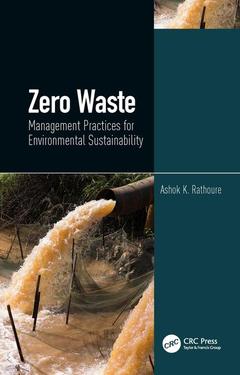Zero Waste Management Practices for Environmental Sustainability
Coordonnateur : Rathoure Ashok

Zero Waste: Management Practices for Environmental Sustainability presents approaches for resource management centered on reducing waste and reusing and recycling materials. It aims to save energy by reducing energy consumption associated with extracting, processing, and transporting raw materials and waste, and also to reduce and eventually eliminate the need for landfills and incinerators. This book presents the various principles, methods, and tools that can be used to address different issues in the areas of industrial waste reduction and sustainability. It examines how to eliminate waste at the source and at all points of a supply chain, and how to shift from the current one-way linear resource model to a sustainable "closed-loop" system.
- Proposes strategies for businesses to reduce and reuse waste with a goal of reaching a zero waste status.
- Focuses on how mitigating waste and promoting recycling can save vast amounts of energy.
- Explains how the zero waste approach would be a key measure to ensure environmental sustainability and help to offset global climate change.
1. Introduction to Zero Waste: Management Practices 2. Zero Liquid Discharge: Industrial Effluent Management 3. Zero Noise Pollution: Green Belt Development 4. Zero Defects in Woven Shirt Manufacturing: Application of Six Sigma Methodology Based on DMAIC Tools 5. Biomedical Waste Disposal and Treatment 6. Best Practices in Construction and Demolition Waste Management 7. Plastic Waste Management Practices 8. Industrial Waste Management System 9. Role of Microbes in Solid Waste Management: An Insight View 10. Management of Solid and Hazardous Waste as per Indian Legislation 11. Good Practices of Hazardous Waste Management 12. Hydroponic Treatment System Plant for Canteen Wastewater Treatment in Park College of Technology 13. Ecological and Economic Importance of Wetlands and Their Vulnerability: A Review 14. Methylene Blue Dye Degradation by Silver Nanoparticles Biosynthesized Using Seed Extracts of Foeniculum vulgare 15. A Green and Sustainable Tool for Physicochemical Analysis of Liquid Solutions: Survismeter 16. Recent Advances in Bioremediation of Wastewater for Sustainable Energy Products 17. Effect of Manure on the Metal Efficiency of Coriandrum sativum 18. Fly Ash: A Potential By-Product Waste 19. Fugitive Dust Control in Cement Industries
Dr. Ashok K. Rathoure holds doctoral degree from Central University (HNBGU Srinagar Uttarakhand). He has experience to work with World Bank, Asian Development Bank (ADB), etc. for various transportation projects like Waterways, Railway, Highway, etc. Dr. Rathoure has more than 14 years of working experience in various domains like preparing EIA/EMP, Modeling studies, wildlife studies/conservation plan, teaching, training, copy-editing, cross/peer-reviewing, etc. His area of research is environmental technology and publication includes more than 100 research papers in international and national journals of repute, and more than 40 books from reputed publishers in India and abroad. He is member of APCBEES (Hong Kong), IACSIT (Singapore), EFB (Spain), Society for Conservation Biology (Washington) and founder of Scientific Planet Society (Dehradun, India) and many more. He is a NABET approved EIA Coordinator (EC) for 5 sectors and expert (FAE). Dr. Rathoure has worked for various industrial sectors viz. Synthetic organic chemicals industry, Mining of minerals, Isolated storage facility, Metallurgical industries (ferrous & non-ferrous), Thermal power, Nuclear Power, Coal Washeries, Cement plants, Pesticides industry, Chlor Alkali industry, Chemical Fertilizers, Paint Industry, Sugar Industry, Oil & gas exploration/transportation, Manmade fibers manufacturing, Distilleries, Common hazardous waste treatment, storage & disposal facilities (TSDFs), CETP, Port & Harbor, Highways, Waterways, Township & Area development, Building & Construction projects for environmental clearance, CRZ clearance, Forest clearance, Wildlife clearance, EC Compliance, ECBC compliance, Replenishment Study, Wildlife Conservation Plan, Mangrove Management Plan, Authorization/permission/objections, etc.
Date de parution : 09-2019
15.6x23.4 cm
Thème de Zero Waste :
Mots-clés :
Physical Water Treatment; environmental sustainability; Fly Ash Composite; construction waste; biomedical waste; industrial waste; hazardous waste; MB Dye; remediation; bioremediation; Tamil Nadu; dust control; debris management; E-waste Treatment; Energy Recovery; Biomedical Waste Management; Biomedical Waste; Plastic Waste; Plastic Waste Management; Hazardous Waste; Mechanical Vapour Recompress; DMAIC Methodology; Fly Ash; MSW Compost; Hazardous Waste Material; TLF; Contaminated Soil; UV Vis Spectral Analysis; Switch Boards; Green Synthesized Silver Nanoparticles; Biosynthesized Silver Nanoparticles; Fugitive Dust; MB Dye Solution; Cod Removal Efficiency



